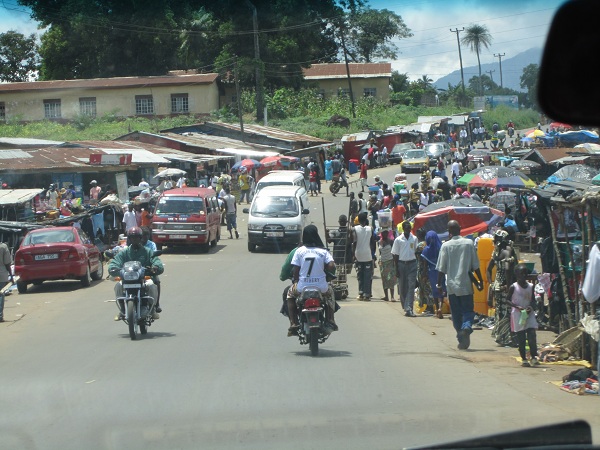Krio – Sierra Leonean
Eh boh! Common phrases in Krio

Whenever you’re in Sierra Leone, or just listening to a podcast, radio station, or watching a video where Krio is spoken, you’ll start to recognize reocurring phrases, sayings, or exclamations. Knowing common phrases will help you hold onto the conversation better and give you some useful vocabulary to get started with small talk.
How this lesson is structured:
- Practice saying aloud the Krio word/phrase a few times, alone or with a partner. Imagining you’re in the scenario, try to be expressive and make your use of the phrases convincing.
- Look back to the lesson on pronunciation to guide your oral practice. Especially review the bold letters to get the pronunciation right.
- Listen to a segment of Plasas and Poyo podcast, linked below. Write down any of the phrases you just learned in your notes. Describe the context where the phrase was used and where the speaker placed emphasis within the phrase/word.
Phrase 1: A tehl Gohd tenki
This is a common response to the greeting, “How are you doing?” (Aw di bodi) It translates to I tell God thank you, which is to say, “I’m doing well”. Oftentimes this is a standard response to questions like, “How is your family?”, “How was the drive home?”, “How did your daughter do on her exam?”, etc.
Phrase 2: Eh!/Eee! or Eh bo!
Your neighbor plays loud music at 4 am, or your taxi driver is speeding and recklessly passing vehicles on a busy highway. During these moments you might exclaim to no one in particular, or to the taxi driver, “Eh bo!” Eh bo! is directed more towards an individual (bo), whereas Eh/Eee! can be a more general lament.
Phrase 3: Duya or Duya, a behg.
It’s always polite to say please when asking for something. For example, if you ask your waiter for another serving of Jollof rice, it doesn’t hurt to begin or end with “Duya”. “Duya, a behg”, adds more emphasis and is more relevant in a desperate situation.
Phrase 4: Bay Gohd (in) pawa
This translates to “By God in Power”, or “God willing”, which is used synonymously with the Arabic phrase “Inshallah”. For example, you might say “my plane lands in two hours, by God in power”, or “my daughter will graduate next year, by God in power”. [About half of the population identifies as Muslim, with population variation by region. Further, informal Qur’anic schooling is also common among Muslim communities, so children begin learning Arabic early. Almost everyone identifies as either Muslim or Christian.]
Plasas and Poyo Podcast
(Listen to the first 10-30 minutes.)
They discuss a complex topic: sababu. Write in your notes the hosts’ discussion of what this term means in Sierra Leone. What is your interpretation of sababu after listening to the podcast?
https://soundcloud.com/user-866404401/episode-19-edit-01022020-1226

